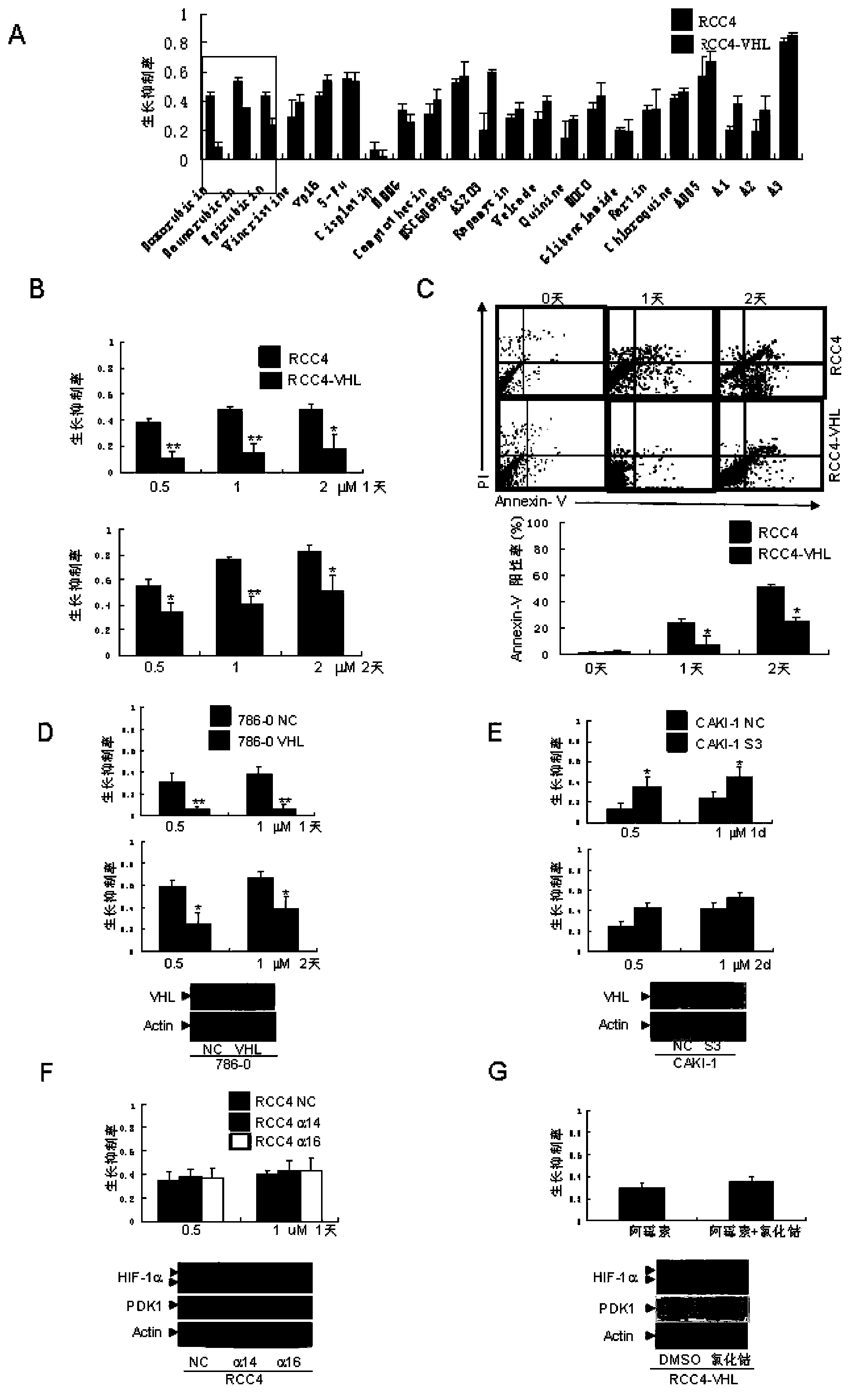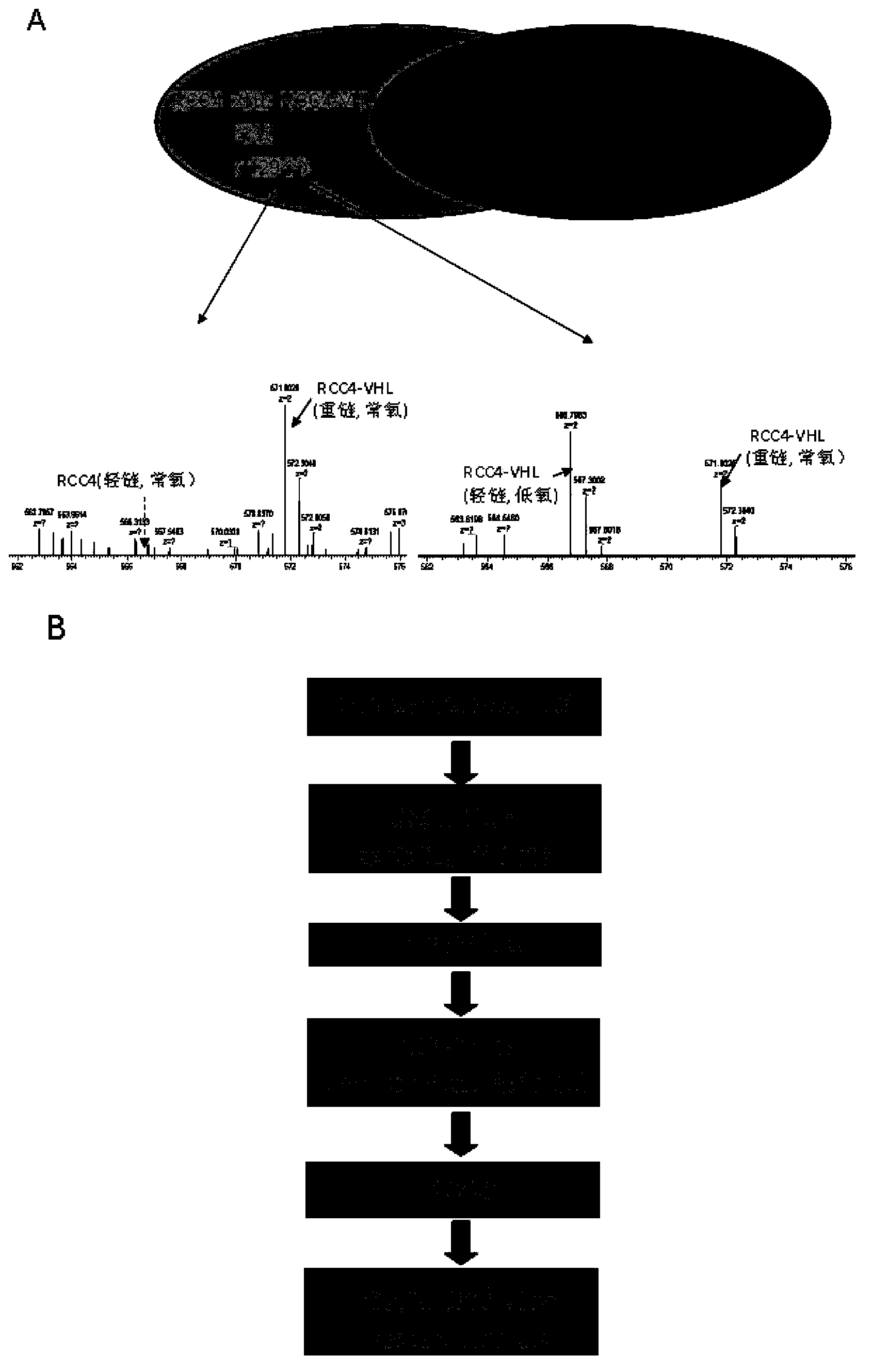Application of acetaldehyde dehydrogenase 2 as drug target for treating tumor cells with anthracycline type chemotherapy drugs
A technology of acetaldehyde dehydrogenase and chemotherapeutic drugs, applied in the fields of biotechnology and medicine, can solve the problems of increasing the risk of multiple cancers, and achieve the effects of increasing the killing effect and wide application prospect.
- Summary
- Abstract
- Description
- Claims
- Application Information
AI Technical Summary
Problems solved by technology
Method used
Image
Examples
Embodiment 1
[0031] Example 1: Anthracycline chemotherapy drugs specifically kill VHL-deficient renal clear cell carcinoma cell lines.
[0032] Based on the deletion of VHL-expressing renal clear cell carcinoma cell line RCC4 cells, we transfected VHL to construct a VHL-expressing cell line RCC4-VHL, and transfected empty RCC4 cells, such as figure 1 As shown, RCC4 cells under normoxic (N) and hypoxic (H) treatment conditions, due to the absence of VHL, HIF1-expressed continuously; while RCC4-VHL cells, due to the expression of VHL, HIF1- only accumulated under hypoxic conditions . Using RCC4 and RCC4-VHL cells as models, we tested the cell growth inhibition rate of commonly used chemotherapeutic drugs and some potential anti-tumor drugs CCK-8. We found that anthracycline chemotherapy drugs (in the red box) specifically inhibited the growth of RCC4, but had little effect on RCC4-VHL ( figure 2 A). We further verified with different concentrations and times, and found that there were su...
Embodiment 2
[0033] Example 2: Through proteomics and large-scale screening methods, it was found that VHL may cause differences in the sensitivity of cells to DOX by regulating aldehyde dehydrogenase 2.
[0034] Example 1 suggested that the genes affecting the sensitivity of anthracyclines in renal cancer cells are HIF-1-independent, so we treated RCC4 and RCC4-VHL cells with normoxia and hypoxia, respectively, and used quantitative proteomics based on SILAC A method to find proteins that are only regulated by VHL but not regulated by HIF-1 ( image 3 A), a total of 129.
[0035] In order to further find out those proteins that affect doxorubicin sensitivity, we established a nematode drug screening model, the screening process is as follows image 3 B, first we verified whether our screening model was available, we knocked out VHL in nematodes, and the number of nematodes died after being treated with DOX was significantly more than that of the control group ( Figure 4 A, Figure 4 C...
Embodiment 3
[0036] Example 3: VHL can transcriptionally regulate aldehyde dehydrogenase 2.
[0037] like image 3 As shown, we found that aldehyde dehydrogenase 2 (ALDH2) was significantly regulated by VHL, while HIF-1 did not affect its expression. At the same time, we verified the results of proteomics. We treated RCC4 and RCC4-VHL cells under normoxia and hypoxia respectively, and detected the protein of acetaldehyde dehydrogenase 2 by WB ( Figure 5 A) and mRNA expression ( Figure 5 B), The protein and mRNA levels of aldehyde dehydrogenase 2 are only regulated by VHL, but not by HIF-1 and hypoxia. Further, we knocked out VHL in RCC4-VHL cells ( Figure 5 C), overexpression of VHL in 786-0 cells ( Figure 5 D), knocking out VHL in CAKI-1 cells ( Figure 5 E), it was found that VHL always positively regulates the mRNA of ALDH2 from the transcriptional level. In addition, we wanted to know whether this regulation is unique to renal clear cell carcinoma, so we selected a liver canc...
PUM
 Login to View More
Login to View More Abstract
Description
Claims
Application Information
 Login to View More
Login to View More - R&D
- Intellectual Property
- Life Sciences
- Materials
- Tech Scout
- Unparalleled Data Quality
- Higher Quality Content
- 60% Fewer Hallucinations
Browse by: Latest US Patents, China's latest patents, Technical Efficacy Thesaurus, Application Domain, Technology Topic, Popular Technical Reports.
© 2025 PatSnap. All rights reserved.Legal|Privacy policy|Modern Slavery Act Transparency Statement|Sitemap|About US| Contact US: help@patsnap.com



